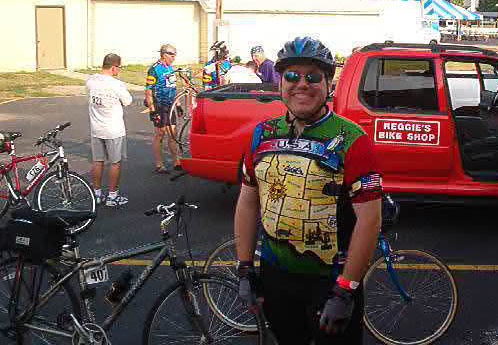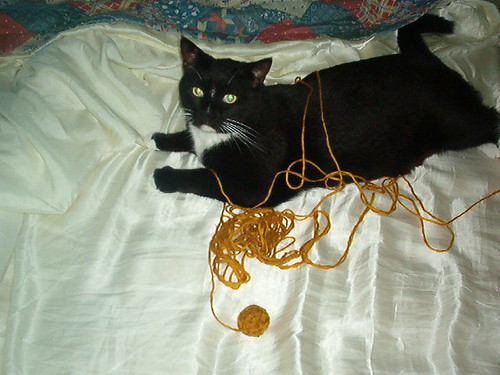
Lazy Kitty
In the 93º heat, what else is there for a cat to do in the day but lay around?
...a mapmaker in Washington DC.


You scored as Emergent/Postmodern. You are Emergent/Postmodern in your theology. You feel alienated from older forms of church, you don't think they connect to modern culture very well. No one knows the whole truth about God, and we have much to learn from each other, and so learning takes place in dialogue. Evangelism should take place in relationships rather than through crusades and altar-calls. People are interested in spirituality and want to ask questions, so the church should help them to do this.
What's your theological worldview? created with QuizFarm.com |
| Demographic & % of demographic in electorate | Support Bush | Total % of Bush Supporters in electorate | |
| jewish | 3% | 25% | 0.75% |
| other | 7% | 23% | 1.61% |
| none | 10% | 31% | 3.10% |
| total | 20% | 27.3% | 5.46% |
| RACE | % of demographic in electorate | Support Bush | Total % of Bush Supporters in electorate |
| black | 11% | 11% | 1.21% |
| Latino | 8% | 44% | 3.52% |
| Asian | 2% | 44% | 0.88% |
| Other | 2% | 40% | 0.80% |
| Total | 23% | 27.87% | 6.41% |


Almost since the beginning of its relationship with the state, Capital has invested state money - totaling nearly $1 million - with controversial Ottawa Hills real estate mogul John Ulmer. Mr. Ulmer's companies agreed to pay Rare Coin Enterprises, one of Capital Coin's wholly owned subsidiaries, 10 or 12 percent on the investment.
Mr. Ulmer takes investors' money and buys homes, often in the lower-income parts of Toledo. He then fixes them and resells them, acting as a private bank that charges interest rates above traditional banks and mortgage companies.
The resulting revenue stream allows him to provide healthy returns to his investors.
But some community activists and Toledo leaders have accused Mr. Ulmer of buying substandard homes for cheap prices and then reselling them to poor buyers who must pay him inflated prices plus high interest rates. Mr. Ulmer has countered that he's helped people with poor credit realize the American Dream and helped rehabilitate neighborhoods in the process.
Mr. Cowman, the former chief investment officer for the bureau and now director of investment for the Ohio School Employees Retirement System, said he knew Mr. Noe had investments in real estate but said they were short term, which he defined as less than a year. He didn't recall the specific investments, saying there were too many managers to know every single investment.
"We pretty well let our managers use their discretion," he said.
Records filed in Lucas County, however, show that the loans to Mr. Ulmer lasted from a year to five years. Capital Coin, through its subsidiaries, still holds three mortgages valued at $352,000 with Mr. Ulmer's companies, although Mr. Noe has not loaned new money to the company since August, 2000.
Also, Mr. Elliott, the bureau's manager of internal audits, raised questions about the mortgages. He said the bureau had no documentation that the loans to Mr. Ulmer were properly covered by the value of the properties listed on the mortgages.
"While the various notes receivable were collateralized by real estate, as evidenced by mortgages, we found no documentation for appraisals or title searches performed to ensure that the property collateralizing the receivables was of adequate value for the loans," Mr. Elliott wrote.
Last week, the state refused to provide copies of mortgage documentation, which the bureau later required from Mr. Noe, citing the potential that they could be considered "trade secrets" and thus exempt from Ohio's public records law.
But a Blade review of the properties in Lucas County revealed that one of the properties was worth far less than the mortgage value.
Capital Coin, through its Rare Coin Enterprises subsidiary, invested $160,000 in July, 1999, with Ulmer-managed Haven Holdings. In return for the investment, Haven granted Rare Coin a mortgage on a parcel just off Airport Highway in Springfield Township that once had a small single-family home upon it.
According to the Lucas County auditor, that land - now vacant - is worth $25,800. Mr. Ulmer's company, Westhaven Group, LLC, bought it in 1999 for $32,000."
So,let's recap...BLADE: I'm sure the Lagrange Development people would love to take you on a tour and show you what state money has bought in Toledo - blighted homes that are sitting empty today, purchased by John Ulmer. They'd probably be happy to have you interview poor folks who have been charged above-market interest rates [to buy these homes].
TAFT: Then write a story about John Ulmer. The issue is the return, the rate of return for the state.
BLADE: Regardless of its effect on neighborhoods in Toledo?
TAFT: These people, these firms, they are hired to do a job. They are hired to get a return for the state on its investment.
BLADE: And it doesn't matter how they get that return?
TAFT: Of course it matters. It's got to be legal and so forth. This is an investment that's given a return for the state. It's helped us lower workers' compensation rates, which is good for the state.
BLADE: We don't want to imply or state that you don't care that Ohioans are being charged above-market interest rates, poor Ohioans, based on a state investment.
TAFT: You're looking for whatever angle you can find, and that's fine if you want to do that. I don't have all the facts on that. All I can say is that the Workers' Compensation Bureau has a very open, a very competitive policy with regard to how they choose investors. They hold them accountable for results, and that policy seems to have worked in this case to the advantage of the state."
"Well, let's look behind us and see what the problem is. We want our money back," she said.
Harm was done to the fabric of Toledo, "unfortunately, supported by state funds," she said.
She said Mr. Ulmer is responsible for "hooking people into a cycle of indebtedness from which they cannot escape. And now we know because of Tom Noe, [Mr. Ulmer] has been doing so with state money. Our money. And we want it back."
Beth Lewandowski, president of Lagrange Village Council, said "The state of Ohio is very likely a Toledo slumlord."
She called on politicians to contribute donations from Mr. Noe to Lagrange Development Corp. "to help people harmed by John Ulmer." She asked Mr. Ulmer to contribute $500,000 "to begin undoing the damage caused by his presence in the Lagrange neighborhood.""
